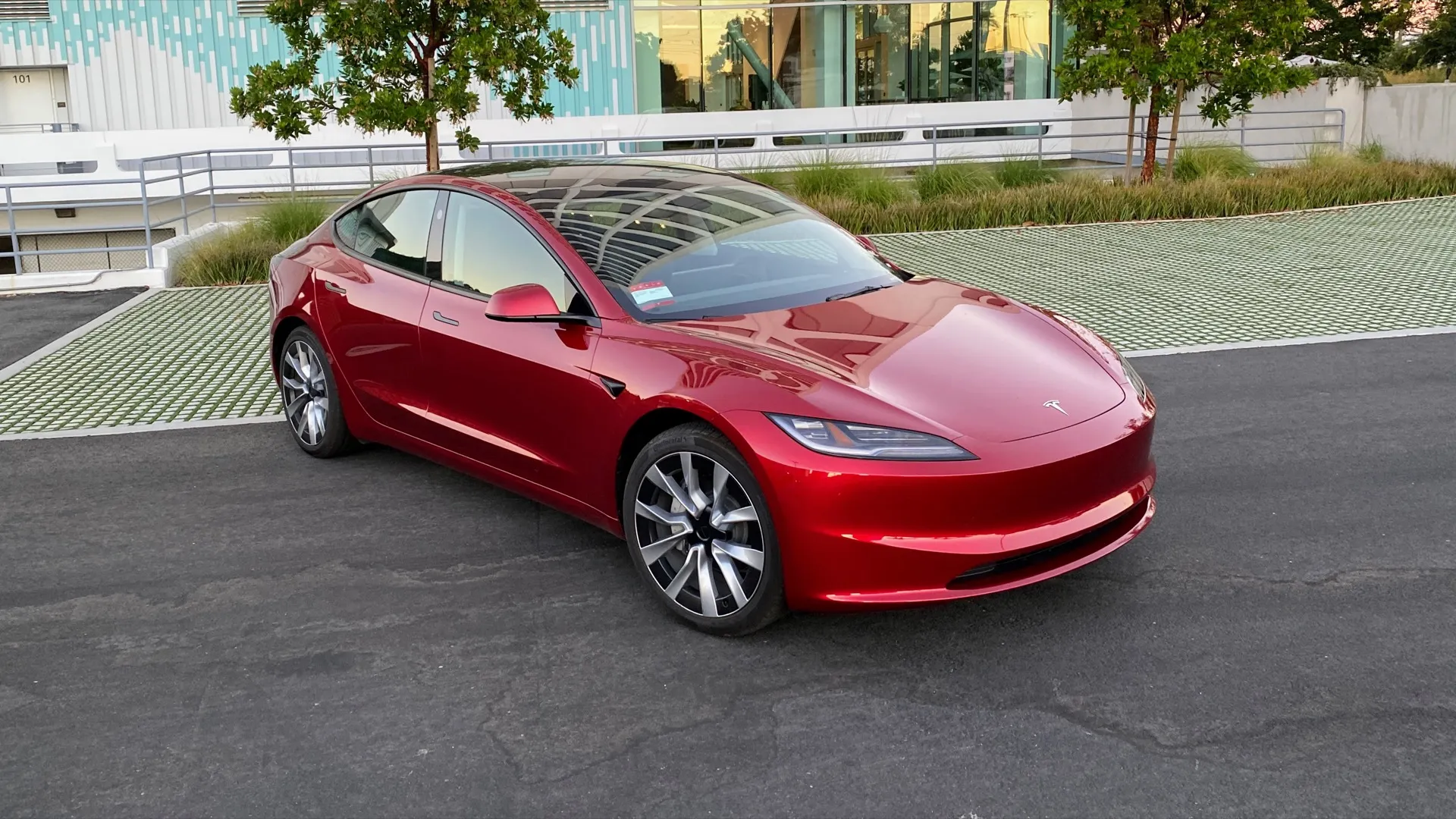- Model 3 Highland offers a refined ride, more hushed interior, better fit/finish
- Base LFP version maintains nimble, athletic driving impressions
- Saw more than 4 mi/kwh in real-world driving, 23-min. charging 15-80%
Other automakers may have reason to breathe a sigh of relief that CEO Elon Musk has continued to stifle Tesla sales growth, as some analysts see it.
That’s because the Model 3 Highland is a great car, a home run of a product that has all the efficiency and charging ease of its predecessor but is easier to live with.
And yet, in a parallel between the car and Tesla’s top executive, it’s only the right fit if you can look past a few exasperating interface details that may truly be deal-breakers.
I enjoyed driving this base Model 3 immensely. It’s no longer one of the noisier EVs from inside. It rides and drives with more verve than the original, broadening the appeal of this formative EV, and it exemplifies the clever tuning and engineering the company has always done well.
2024 Tesla Model 3
Earlier this year, the version informally called Highland arrived and it could be misunderstood as a light mid-cycle refresh. But as I can now confirm after a 24-hour speed date with one—ehem, Turo loan—it’s much more than that.
Full disclosure: I experienced the Model 3 in Southern California, where roads are generally in fine shape, the weather is mild, and it can feel like Superchargers are nearly as ubiquitous as gas stations.
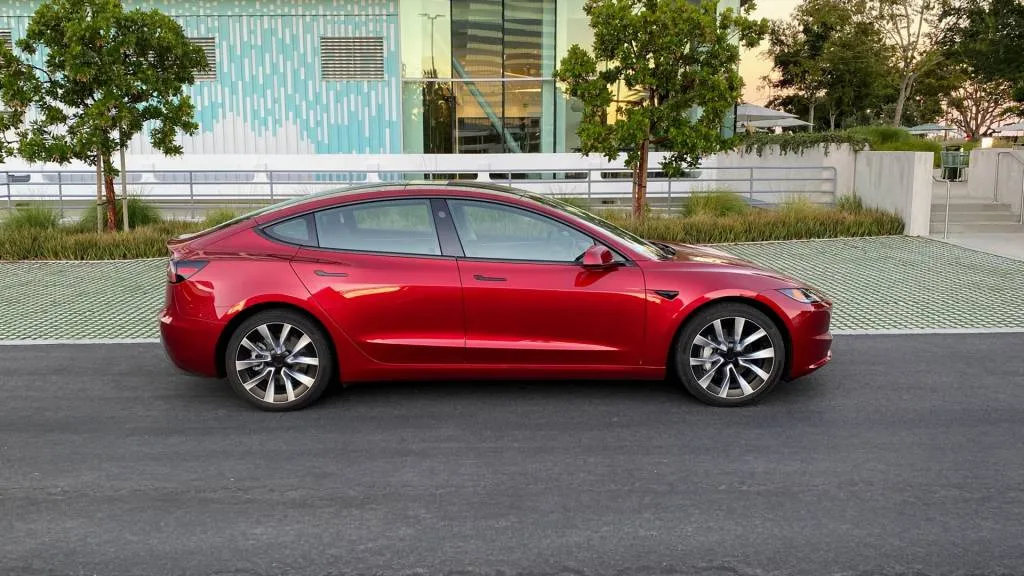
2024 Tesla Model 3
The base Tesla Model 3, dressed up a bit
To step back first, the Highland Model 3 has the same profile we’ve become accustomed to since Tesla started Model 3 deliveries back in 2017—including the same doors and side/rear surfacing—but from the front or rear it looks like quite a different vehicle. I wasn’t sure how I felt about the rear styling compared to the original Model 3 and its cleaned-up lighting moved into the decklid, even by the end of my speed date with it. But I noted that the front end and its more decisive crease running across helps the whole roofline look sportier and more coupelike from almost any front angle.
The Tesla Model 3 I drove was the base Rear-Wheel Drive model, optioned with the showy, lustrous Ultra Red paint ($2,000) and the 19-inch Nova wheels ($1,000) fitted with Continental ProContact rubber, which drop EPA range for this model to 248 miles, from this model’s peak 272 miles with the 18-inch aero wheels. That brought the price up to $43,630, including the mandatory $1,390 destination and $250 order fees.
This “base” Model 3 comes with a fantastic list of standard features, by traditional car-buying sensibilities: a glass roof, a power trunklid, heated and cooled front seats, a heated steering wheel, heated rear seats, navigation, and a separate rear screen of the sort that has up until recently been solely the domain of high-end luxury cars.
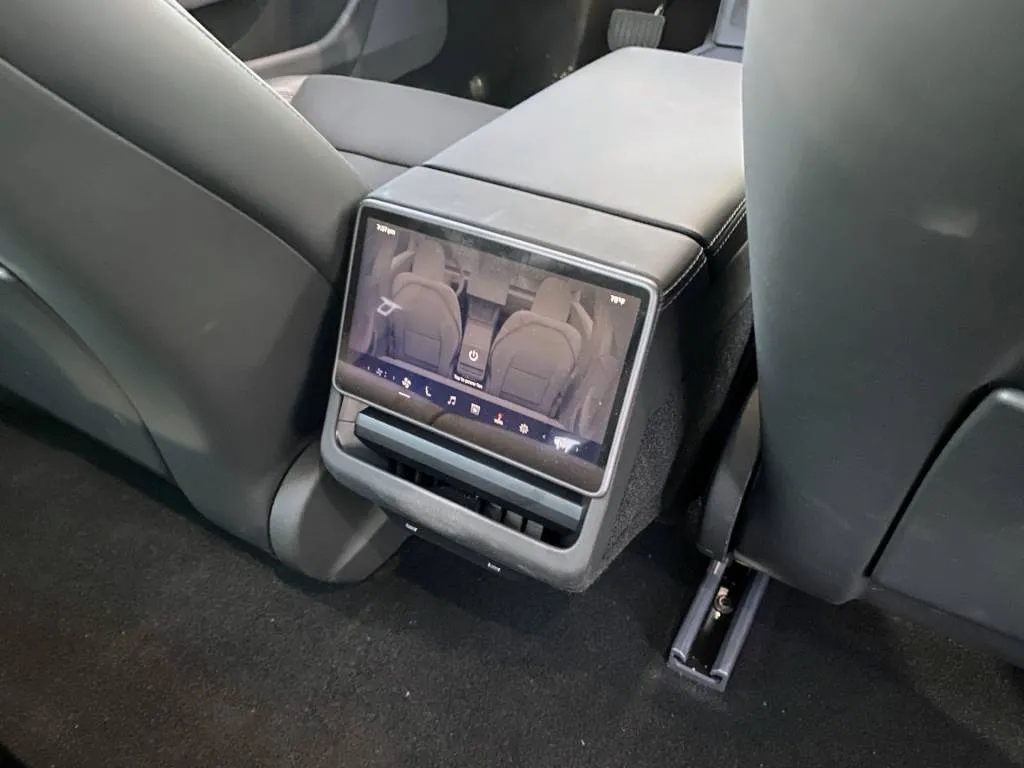
2024 Tesla Model 3
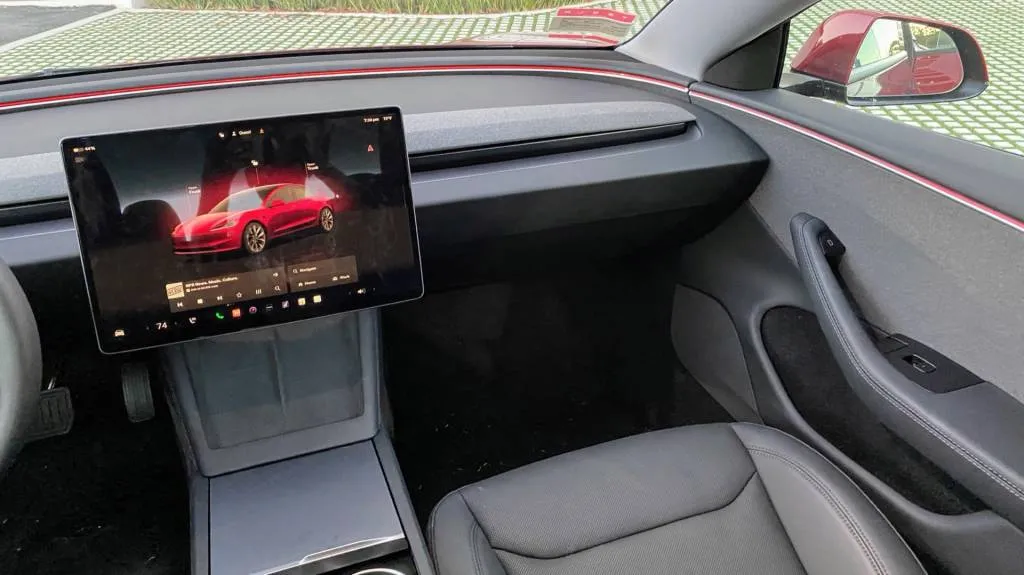
2024 Tesla Model 3
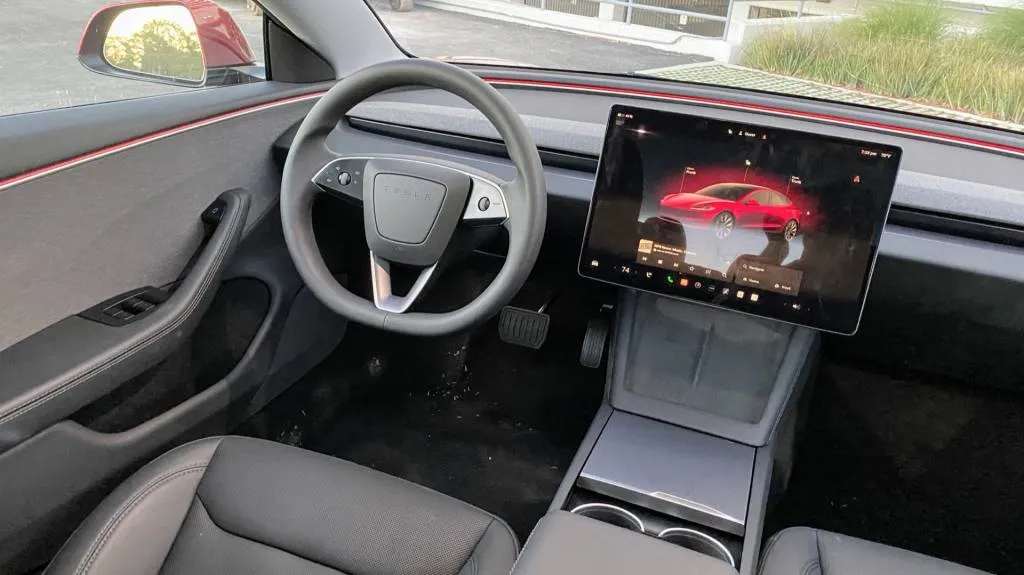
2024 Tesla Model 3
Probably the most noteworthy tech feature “under the hood” in this base Model 3 is that it has a battery pack with 60.9 kwh gross, according to the Department of Energy—with 57.5 kwh of reported capacity—stocked with lithium iron phosphate (LFP) cells in a prismatic format. According to reports, Tesla may be in the process of moving some of this supply chain to the U.S., with supervision from China’s CATL, but for now they’re supplied from China.
Because of its battery pack, this model isn’t eligible for the $7,500 EV tax credit that other Model 3s qualify for with their more made-in-America pedigree. At present, the Model 3 Long Range RWD actually costs $4,000 less if you can buy and claim the credit, although the base Model 3 remains a better deal for leasing. The LFP version does have some other advantages, too—like how Tesla actively reminds you to charge it up to 100% at least once a week.
But from a value standpoint, tax credit aside, it bears keeping in mind that an otherwise identically equipped Model 3 in a less sedate color, with the base 18-inchers, would cost just $40,630.
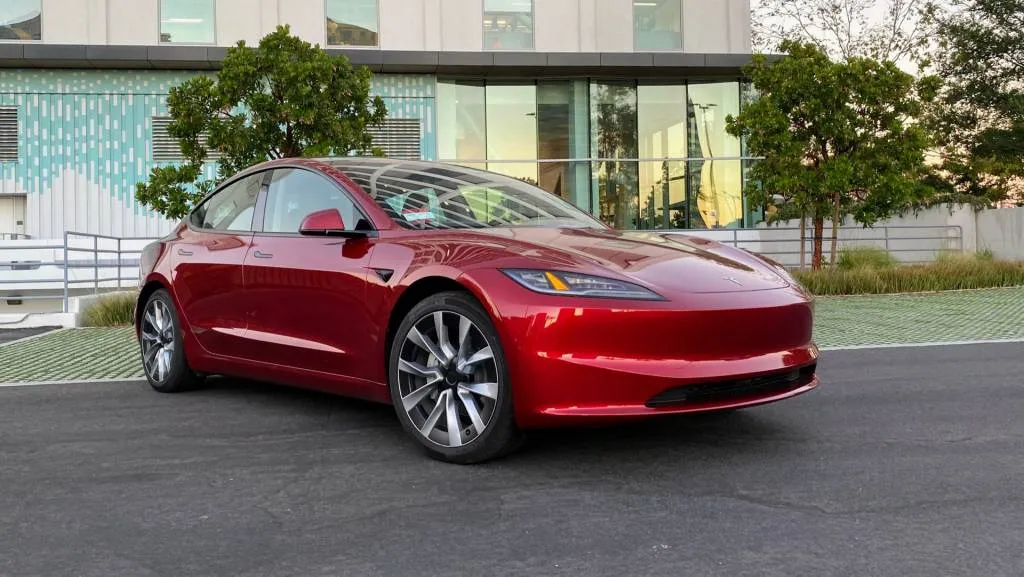
2024 Tesla Model 3
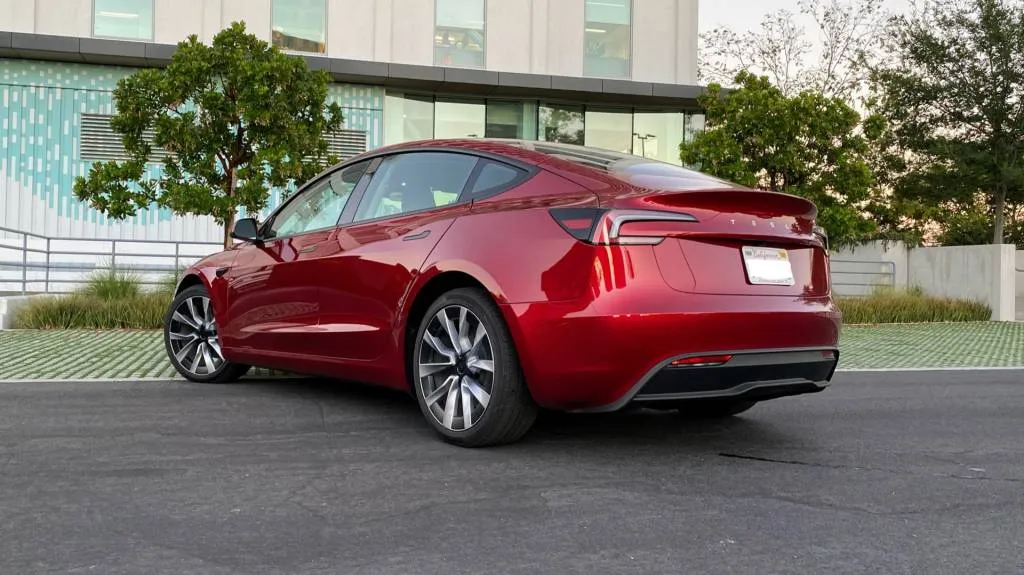
2024 Tesla Model 3
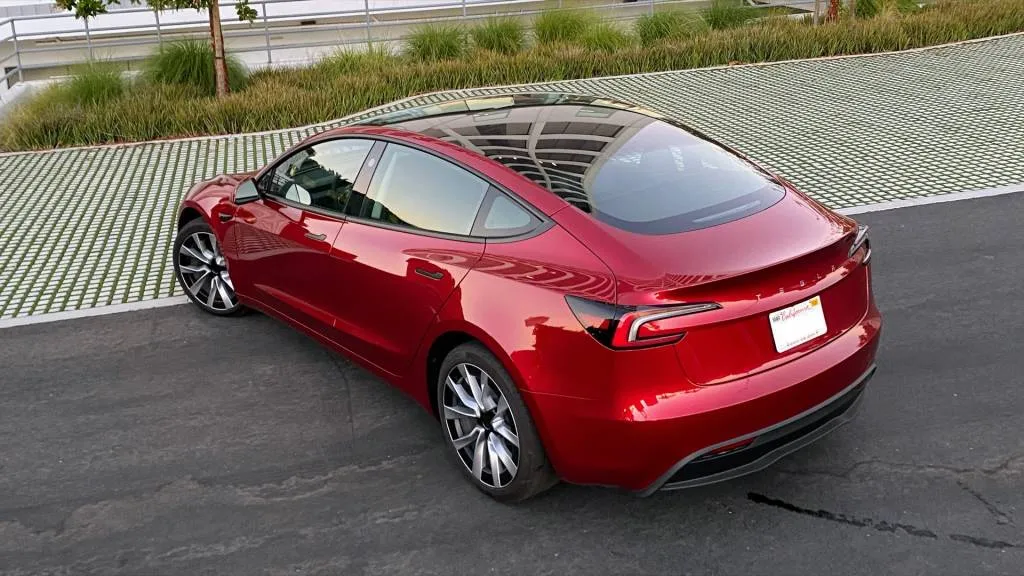
2024 Tesla Model 3
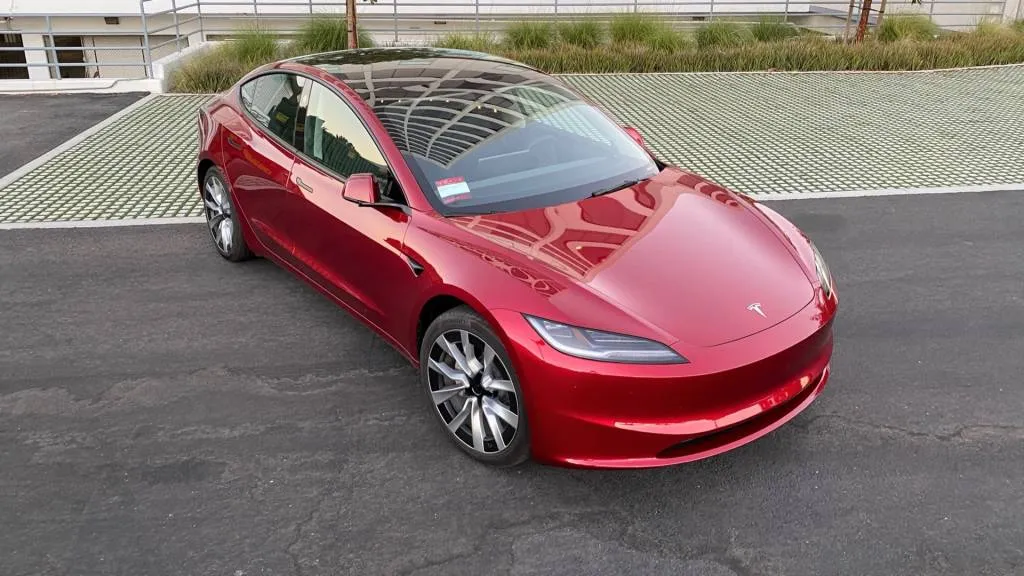
2024 Tesla Model 3
Highland is more soothing at the seams
Giving it a once-over on the outside, everything fit together well and trim and body-panel seams were tight. I’ve seen enough Model 3s up close to know that pre-Highland, many had seams that stood out as uneven or wider than the rest—even the case with the last Model 3 I spent driver’s seat time in, a Tesla press loan in 2019.
Speaking of seats, those in the Model 3 are now heated and cooled in front, and you can turn on the seat ventilation ahead of time via the app. But just in terms of physics and support, they still could use some help. They’re a little bit better than the seats in the first-generation Model 3, but they feel too flat and thinly padded. Really all they need are some better support around butts and backs, to hold you in place in corners. With the seating point nice and low, it’s all that’s getting in the way of feeling the Model 3 is a sporty sedan you sit in, not on, but the lack of hip-hugging seats leads to the latter impression.
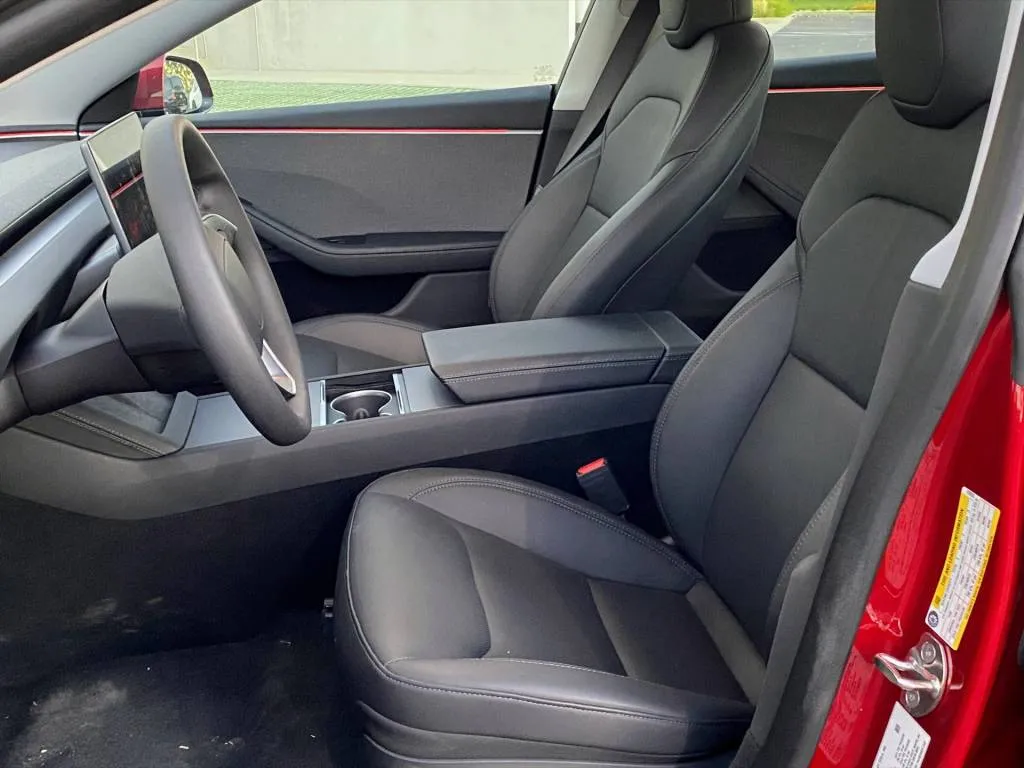
2024 Tesla Model 3
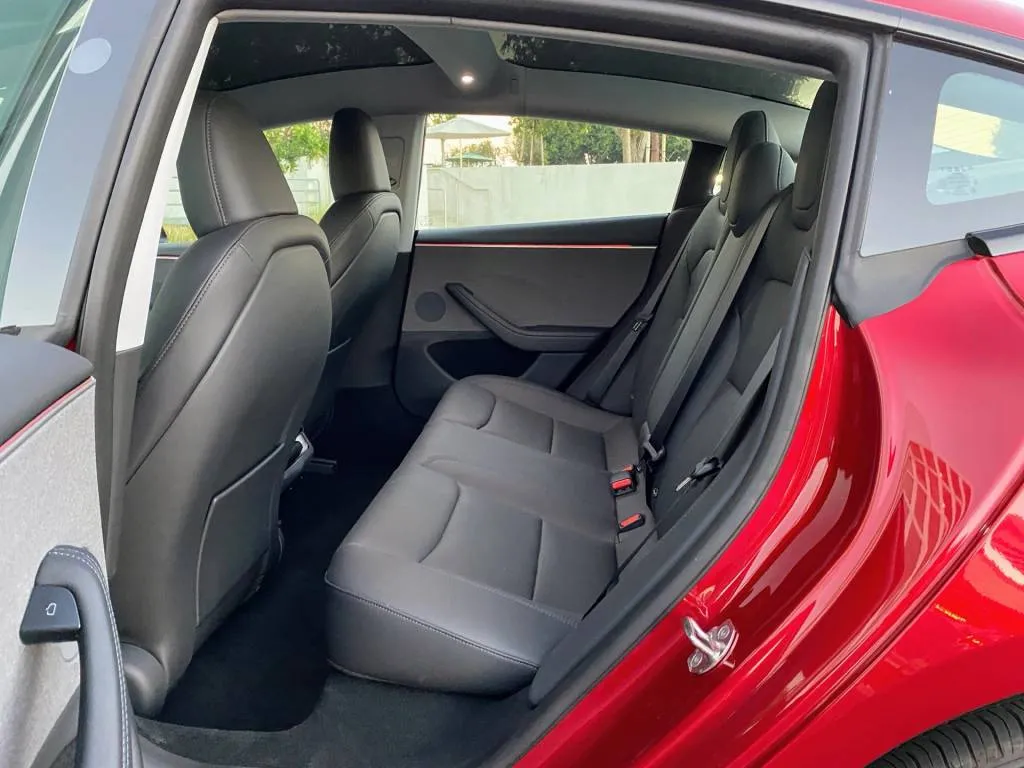
2024 Tesla Model 3
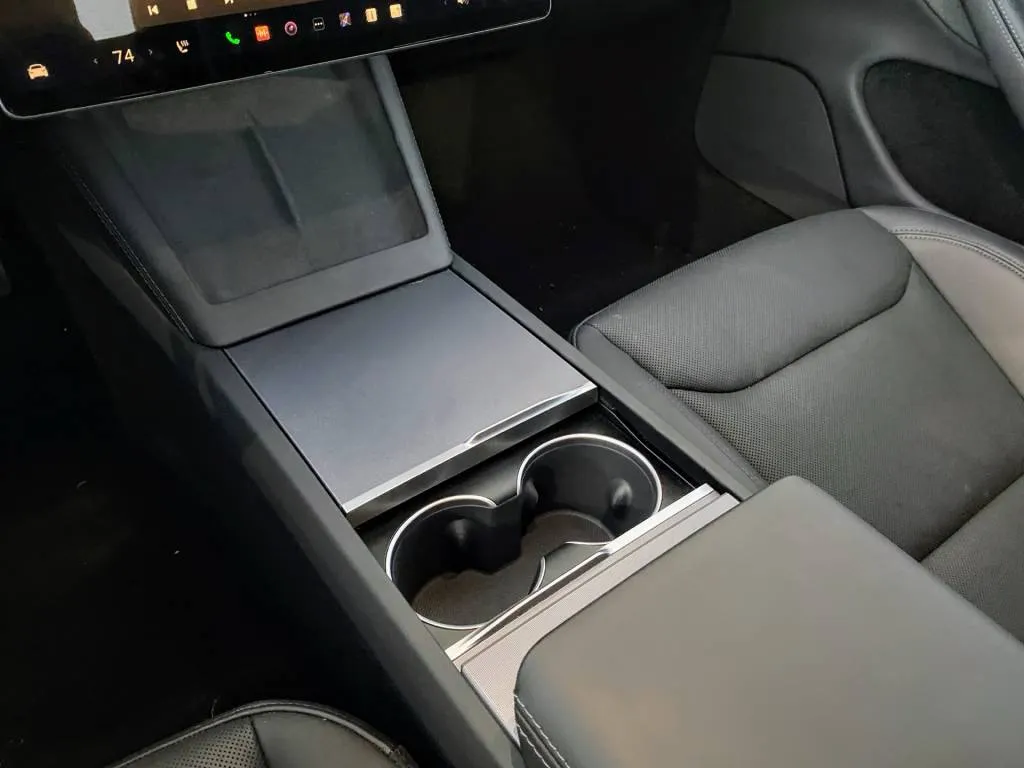
2024 Tesla Model 3
While the seats haven’t improved a lot, ride quality is night-and-day different. The outgoing version had a ride that we described as stiff and busy, and even when you were on near-perfect road surfaces there was still road noise. At first by noise and comfort alone it was like stepping into a luxury-badged cousin of the Model 3—even on the coarsely surfaced side streets of Santa Monica where I started.
The best-driving affordable EV?
Heading out to some favorite canyon roads, I soon found that the Model 3 doesn’t pull any punches in LFP form. Cost no object, the Model 3—yes, even in this base-model version—would make my shortlist of EVs in which to head out and enjoy driving on a curvy road.
This relatively low-powered Model 3, with a single permanent-magnet motor powering the rear wheels, making 257 hp and 266 lb-ft of torque, felt quicker than its official 0-60 mph times around town and on these most engaging ribbons of twisty tarmac I included in my tour. Although getting from the right lane over to the left on a free-flowing section of US 101 revealed that like other single-motor EVs its lower output becomes known at the upper end of legal speeds.
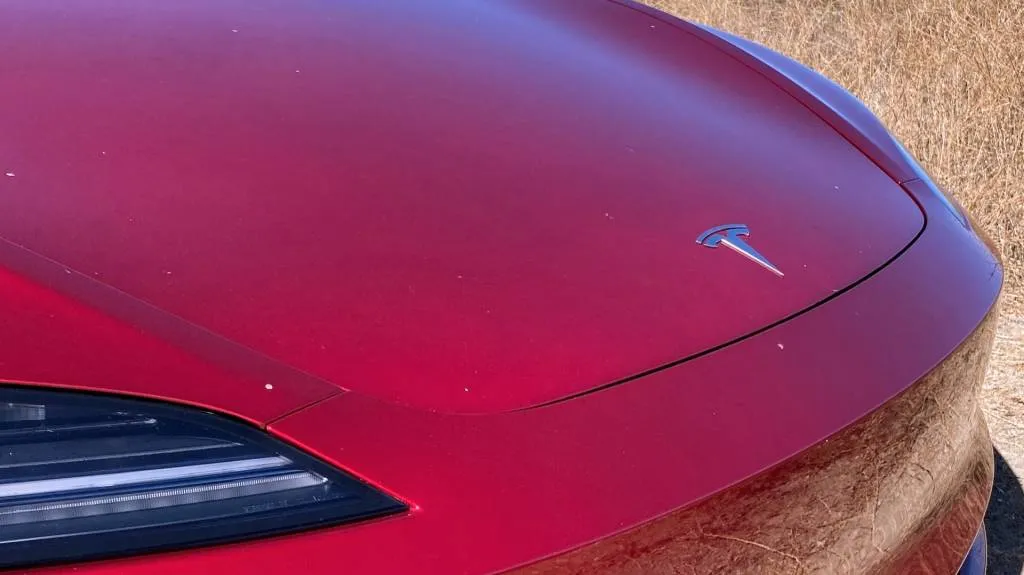
2024 Tesla Model 3
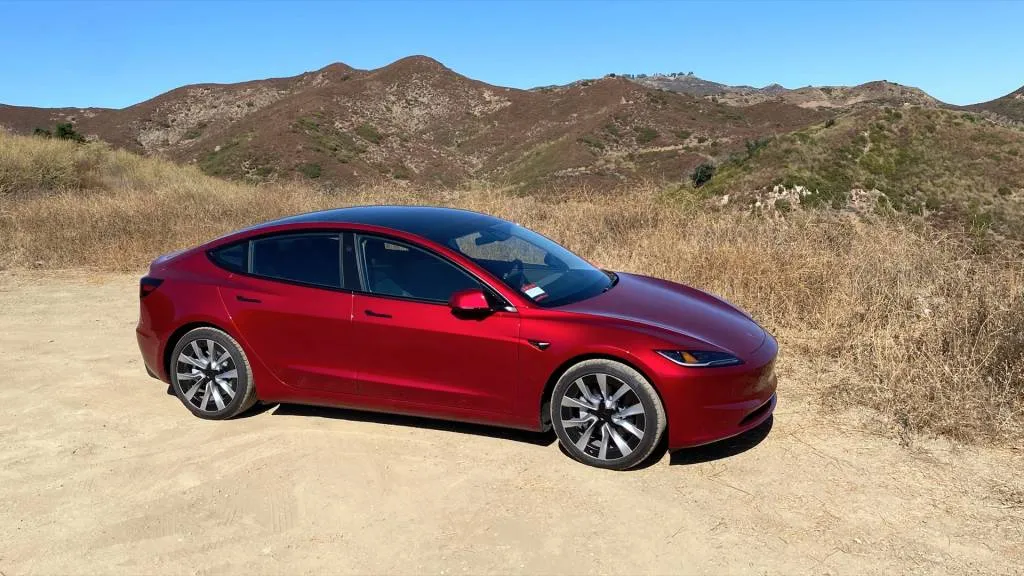
2024 Tesla Model 3
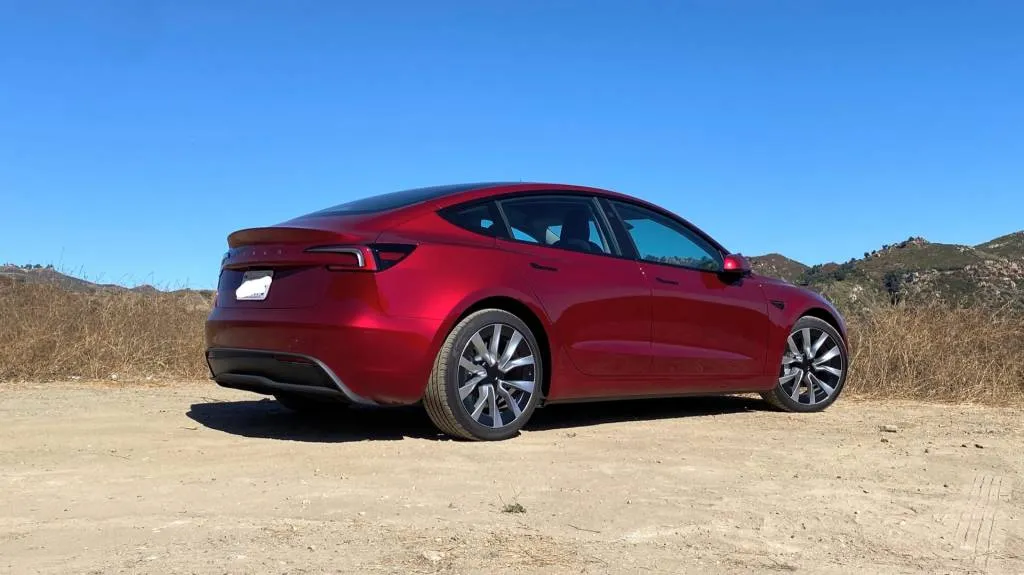
2024 Tesla Model 3
What’s more, it’s nimble and balanced. At a curb weight of less than 4,000 pounds and tuning that kept it feeling light, it felt right at home running a road that might have been a tuning benchmark for many sports cars—or for the Model 3 Performance. I found its steering to be very nicely weighted in both the Standard and Heavy modes (there’s Light too), and the Heavy one didn’t feel artificial in the way it centered as these modes often can.
The base Model 3 isn’t tuned like a performance car, but it feels a lot like base BMW 3-Series models have been tuned for several generations. Push it a little harder and it doesn’t stay razor sharp, but it leans predictably and wiggles in a way you can work with.
Tesla generally gets regen right, and the latest round of vehicles don’t leave you any options. Lift off the accelerator and the Model 3 scrubs off speed quickly, storing energy back in the battery pack, while the brake pedal is reserved for the friction brakes. This was the first Tesla I drove without a light/low regen mode—no optional creep when lifting off the brake either.
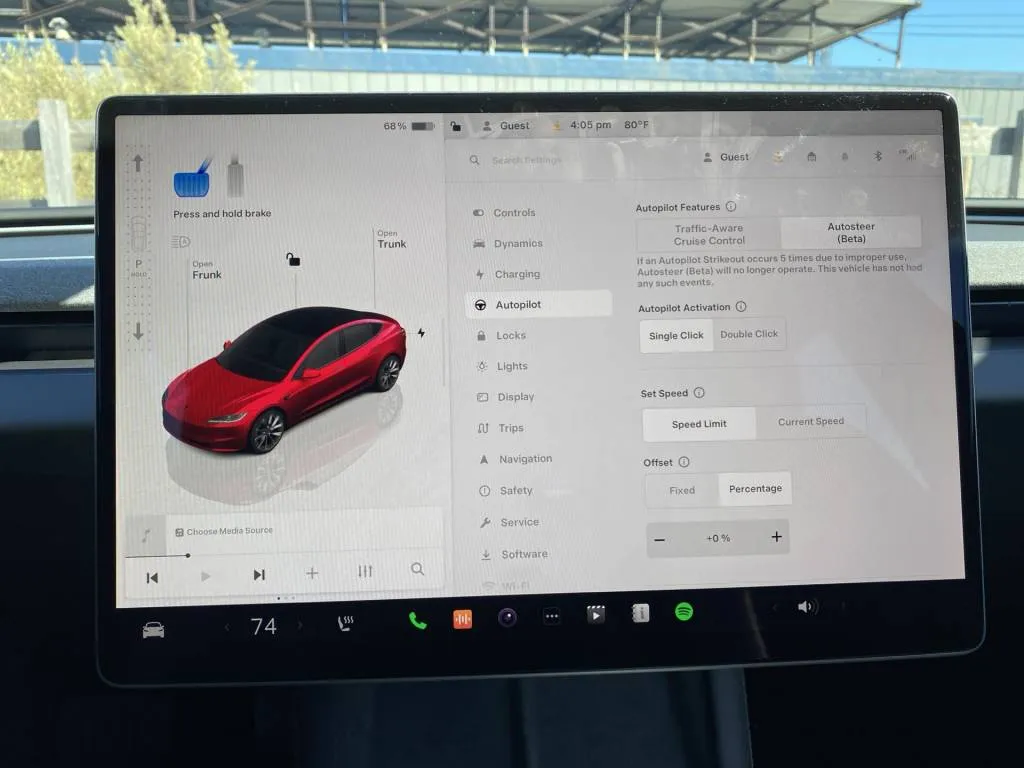
2024 Tesla Model 3
From steering to the accelerator and braking, and body motions, it all amounts to a precision in the driving experience and the inputs that many EVs simply don’t have. It feels like it represents the coordinated effort of an engineering team truly in sync on the priorities.
Indeed, a new front suspension geometry contributes to the finesse and athleticism. Gone is the loud bounding effect we noticed from the front on a curvy road in the original Model 3; instead this version soaks up sudden bumps or changes in the crown of the road in a way that doesn’t perturb things. Tesla has also in the Highland modified the rear subframe that’s always been one of the keys to the Model 3’s refinement, while updating bushings throughout and adding frequency-selective dampers.
Tech aside, Model 3 remains austere
My enjoyment of that athleticism, plus the near perfect ride quality and well-hushed cabin yielded to reality eventually, when I found myself trudging along in traffic, squirming in my seat, and looking around at the textures and surfaces. They’re better for sure, and Tesla made a smart choice to go with textiles instead of the former woodgrain; I’m less certain about the multi-color ambient lighting, which is now in seemingly every new affordable car.
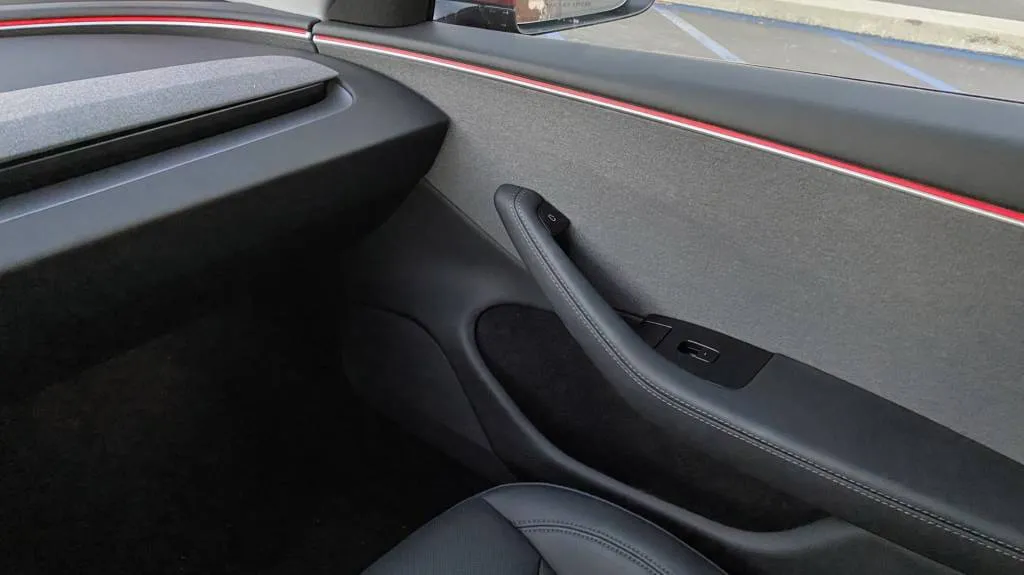
2024 Tesla Model 3
Up close, to the touch, the materials are better and the fit and finish is undeniably improved. That said, this is barely on par with other $40,000 cars and nothing more—and I could come up with plenty of $40,000 vehicles that offer more alluring seats and trims and surfaces.
The Model 3’s centerpoint, its touchscreen, has essentially carried over, and it’s still a better interface than what you’ll find in many other EVs—if you’re OK using a corner of the single screen for gauges and making it your go-to for essentially everything. The left portion of the screen is a constant tally of speed, safety systems, and a rendering of passing vehicles (with audio controls below). But it’s always easy to find what you need quickly through the flat menu system. And a virtual tray with climate controls, navigation, and more is always locked to the bottom of the screen.
There’s no Apple CarPlay or Android Auto, and you have to be alright with that. But native navigation is excellent. Tesla includes standard data for navigation and updates for eight years, while premium data for audio and video streaming, sentry features (live camera), and more costs $99 a year or $9.99 a month.
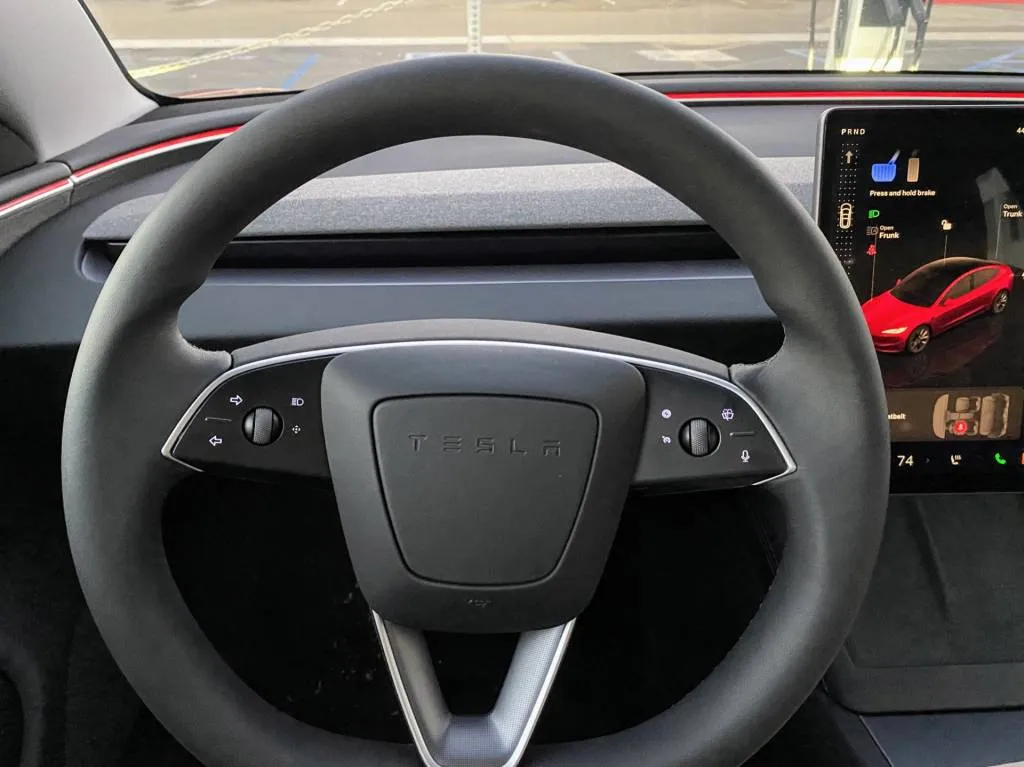
2024 Tesla Model 3
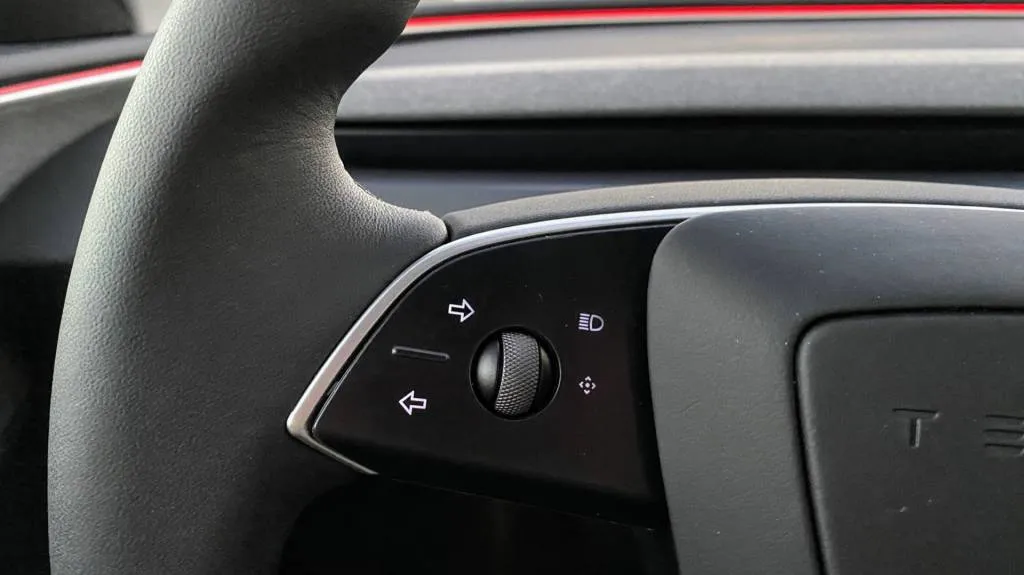
2024 Tesla Model 3
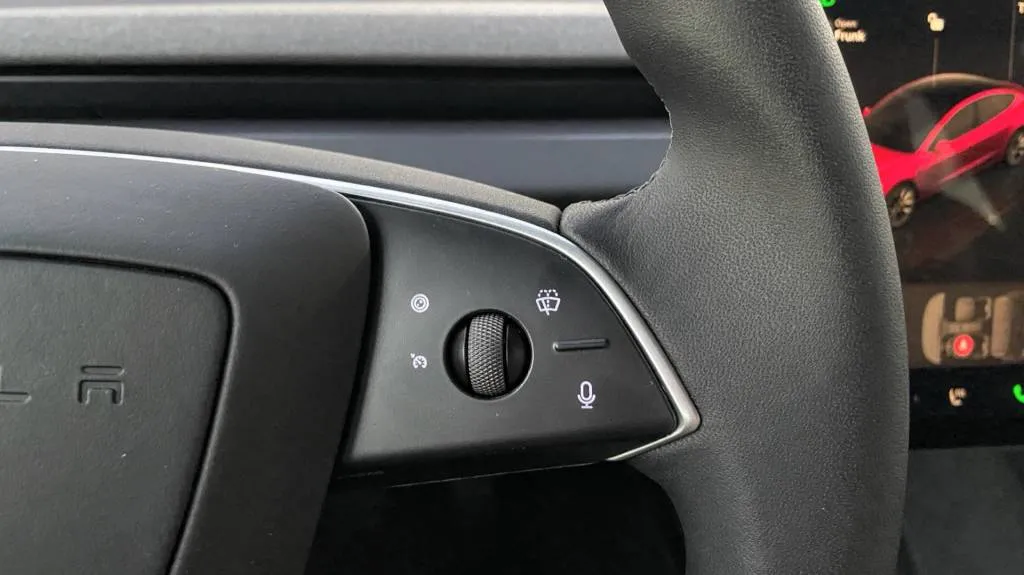
2024 Tesla Model 3
Just as with the previous Model 3, there’s no mirror or steering-wheel adjustment switchgear. You still adjust them with a somewhat clumsy combination of the screen and steering-wheel toggles. And in what feels like an unnecessary party trick, you can still pull the vents around virtually to physically aim them and provide airflow in the direction you want. Now, perhaps as part of Tesla’s push for Full Self-Driving, the Model S/X steering yoke, and seeing all these controls as unnecessary, the Highland consolidates the interface even more, purging the turn-signal stalk and shift lever completely.
Love for the car, heartburn over the interface
It’s that turn-signal function that’s the hardest to warm up to. Two steering-wheel buttons serve the purpose, with right on top and left below, and although you can mentally think it through with an imaginary turn-signal stalk as moving in those same directions, after a day using it, I was still confusing the two when flustered—for quick highway lane changes, for instance. Further, there’s no way from what I can tell of simply flashing the signal three times; you need to press to turn it on, then again to turn it off. I didn’t do any significant night driving, but I can see the same adoption curve for the high-beams—another steering-wheel button.
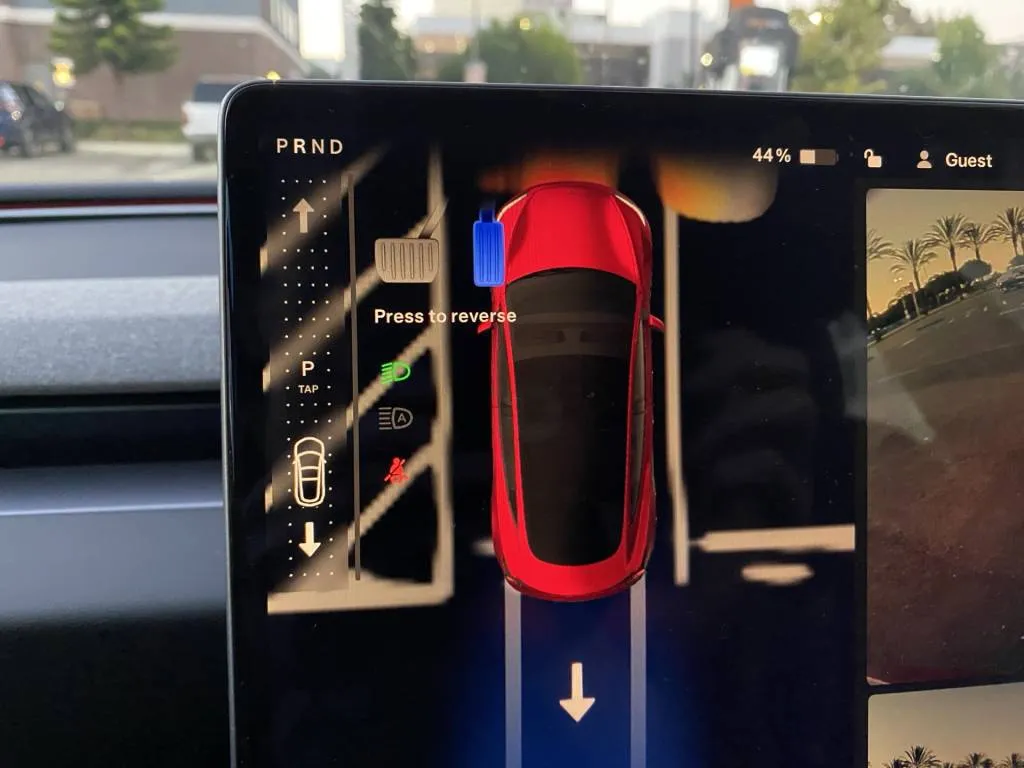
2024 Tesla Model 3
The 2024 Model 3 also loses the shift stalk, and as I found over a day this is much easier to warm up to. A visually textured area in the upper left corner of the screen acts as a shift pad. Once pressing on the brake, drag it up for Drive, drag it down for Reverse, or tap it for Park. There are backup touch-buttons up by the rearview mirror but I never needed to use them and found the screen-based shifting just fine after parking a few times. There’s a predictive shifting feature you can turn on, which will use the camera-and-sensor system, plus present behavior, to decide whether you want to shift to Drive or Reverse. I simply wasn’t in the Model 3 long enough to test this feature.
Some of the interface is markedly better though. Tesla has redone the Model 3’s entry tech, and its effectiveness in recognizing my phone as a key was flawless. While in some other vehicles I’ve faced an uneasiness over whether the car locks as I walk away, I saw the car power down at a distance and then, as I reapproached with the phone in my pocket the car would simply open whatever I went to open up, without further presses or unlocks, whether that was a passenger-side rear door or the trunk.
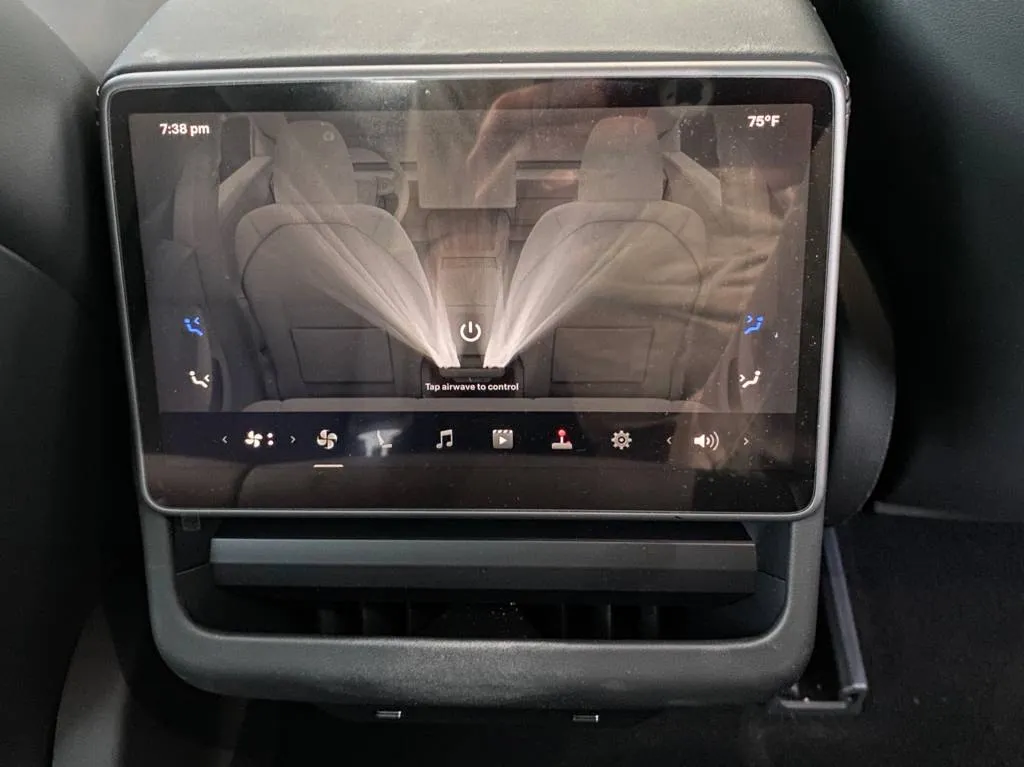
2024 Tesla Model 3
Back-seat passengers now also get their own touchscreen, and it’s no disappointment. It’s just as quick and nearly as full-featured as the one in front, with climate controls (aimable touchscreen vents there too), audio controls, gaming and viewing options, and more. Heated seats are standard for the outboard positions, and that’s how riders control them.
You may have people riding back there, too, as it’s a decently roomy space for two in the back seat, with headroom really the limiting factor. Storage space is really well thought out, too, with big door bins, multiple deep covered bins at the center console, and a soft-touch top to the console that’s good for the elbows of various drivers and passengers. There’s lots of trunk and frunk space (21.0 and 3.1 cubic feet, respectively), and this is one of the few frunks that’s deep enough to be useful. Put the grocery bag with the eggs up there, or stash a couple of daypacks; there’s a lot of space, but things will be snug enough to not go tumbling about.
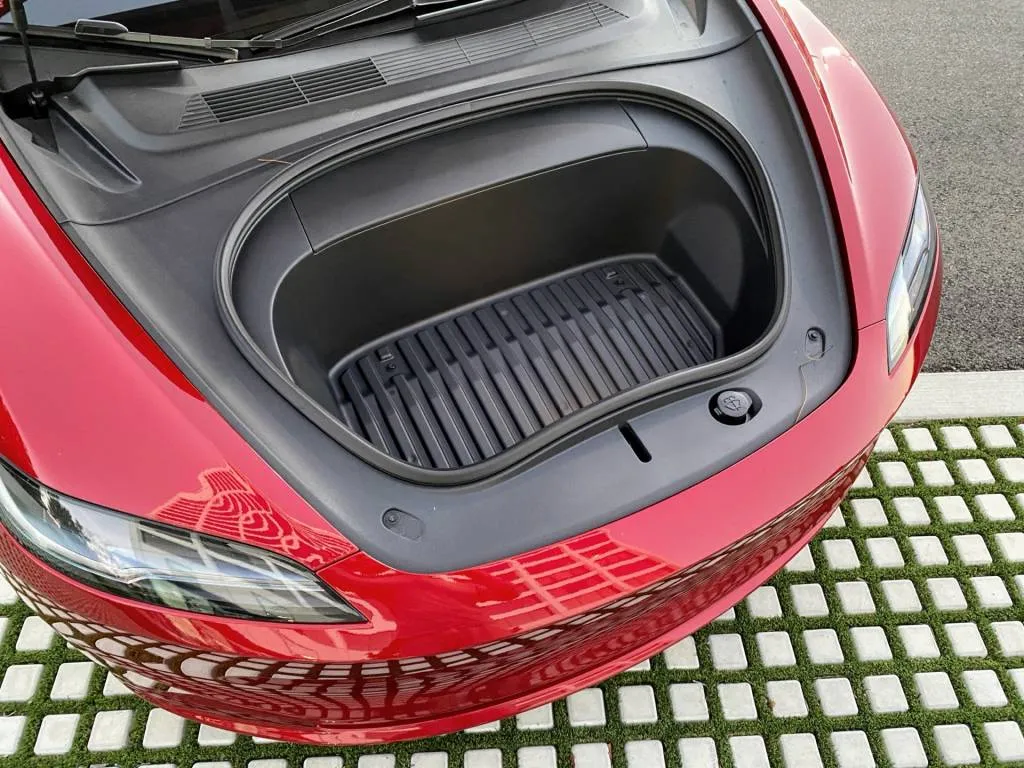
2024 Tesla Model 3
Tesla has redone the sound system, but the nine-speaker audio system in the Highland didn’t impress. While totally fine for podcasts and most streaming music, it lacked the rich low-mid-range frequencies I’d enjoyed in previous Long Range Model 3 and Model Y experiences. Other Model 3 versions still do get a grander sound system.
All Model 3 versions come with the same suite of Autopilot cameras and sensors, but the Model 3 I tested didn’t have the Full Self-Driving package activated (currently $8,000, or by subscription). Thus, I got to see what you get at the base level, and in this form it isn’t bad, but it isn’t one of the best either. It follows a clearly defined lane and generally steers smoothly, but it easily got confused on lanes of LA’s US 101 that had weak striping plus pavement of two materials.
Tesla Model 3 Highland efficiency and charging: Home run
The Highland adds up to a very appealing EV. And it stood up to all the efficiency and charging expectations in my real-world drive.
According to the trip computer I averaged more than 4.1 miles per kwh over 158 miles that were not particularly efficiency-minded. They included boulevards, some coast cruising, demanding canyon roads, and a mix of free-flowing freeways and the traffic slog on I-405. Most of that time the temp was set to 74 degrees F, but I lowered it for a time when too much midday sun was coming directly in through the side roof (potentially an issue).
Tesla’s route planning is the benchmark, and it’s still easy to see why. The Model 3’s navigation system routed me quickly toward a Supercharger station after selecting from a few possibilities, showing me how many chargers were available as well as how many other Teslas were heading there for a charge. The Santa Monica Supercharger station was well-maintained, with bathrooms on premises and an overhead solar array providing shade.
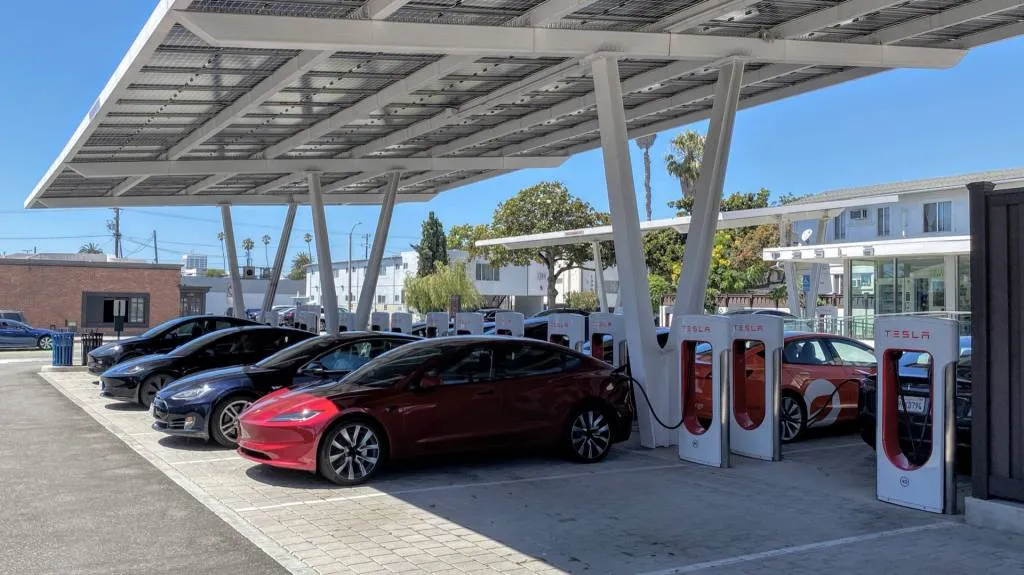
2024 Tesla Model 3at Santa Monica Supercharger station
Tesla lists a 170-kw maximum charge power for the LFP model, and I saw 168 kw briefly when I first started a charge from 15%. From there it took just 23 minutes to charge up to 80% (the limit at the busy Santa Monica station where I charged). At 80%, it indicated a range of 189 miles—figuring out to nearly 240 miles in the real world at a full charge, with those showier wheels.
Efficiency and charging are the known quantities for Tesla, and that’s why I led with everything else. The few hair-pulling interface decisions and undue drama from the top aside, Tesla’s made a very quiet, well-mannered, very pleasant-driving EV—one that I’d go out of my way to drive rather than be driven in, and one that earns its keep in ways beyond efficiency, Supercharging, and Autopilot.

2024 Tesla Model 3
Why again is Tesla making cars that are so much fun to drive if it wants us to relinquish the steering wheel and send the car off to be a robotaxi? Not really part of the now-wiped-away Master Plan, is it?

